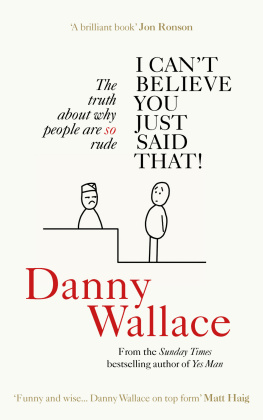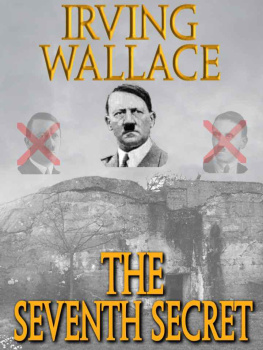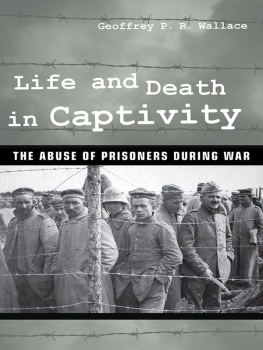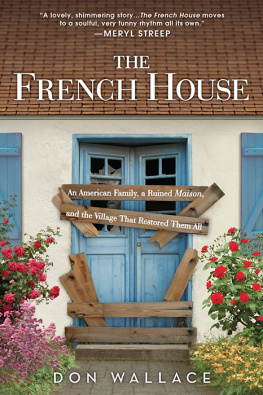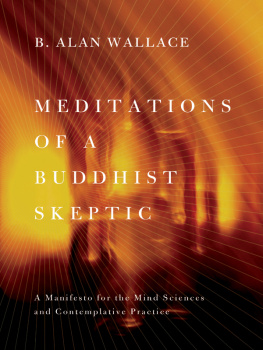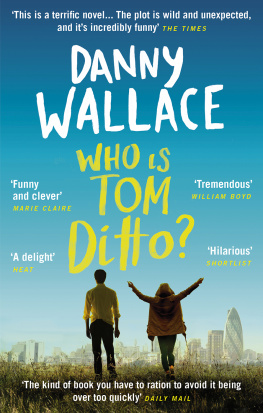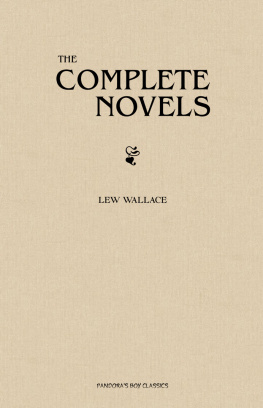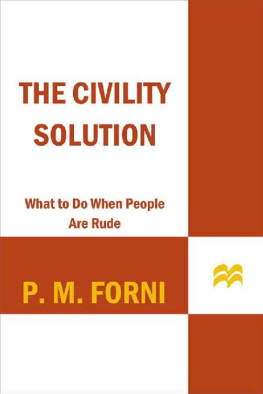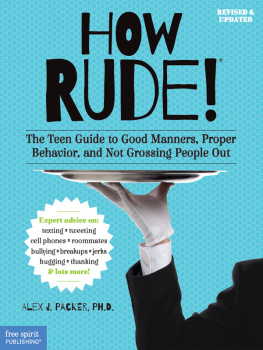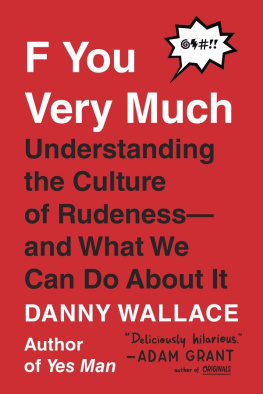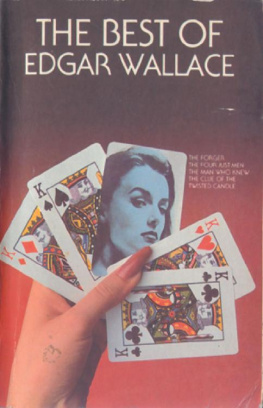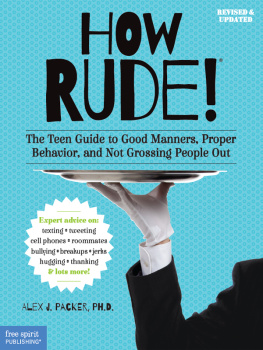About the Author
Danny Wallace is a Sunday Times-bestselling author who lives in Los Angeles and Suffolk. His award-winning column in ShortList magazine reaches more than 1.3 million readers weekly. He has made comedies and documentaries for television and radio, and won the Arqiva Award for Presenter of the Year as host of the Xfm Breakfast Show with Danny Wallace. GQ magazine has called him: One of Britains great writing talents.
www.dannywallace.com
About the Book
Passive aggression. Victim blaming. Snarky tweets. Queue-jumpers. Idiots who are #justsaying. Banter. Furious waitresses who refuse to sell you a hot dog We are ruder than weve ever been.
In this incisive and very funny book, Danny Wallace investigates the new wave of rudeness that threatens to overwhelm us. He meets psychologists, psychiatrists, bell boys, cab drivers, bin men, barristers, politicians, a limo driver called Jos and at least one expert in cooked meat production. He examines Radical Honesty in Germany and road rage in LA. He even confronts his own troll. And in doing so, he brilliantly uncovers the hidden truths behind what makes us rude, whether its catching, and how even one flippant remark can snowball into disaster.
From the mayor in Bogot who recruited an army of mimes to highlight inconsiderate driving, to the jihadist who launched a blistering attack on the bad manners of his fellow ISIS militants, this is an eye-opening and often hilarious exploration of the way humans work and why it is time for an anti-rudeness revolution.
Acknowledgements
Its impossible to write about rudeness without also talking about it. Im indebted to my friend, the writer Marc Haynes, for being a sounding board, discussions partner, and for his help with extra research on some of the topics in this book. Also, as always, to my brilliant editor Jake Lingwood and agent Robert Kirby. Greta, Elliot, Clover and the Bump thank you so much for listening to me talk so much about hotdogs. Thanks to Howard Watson and Laura Horsley. Wag and Sara Marshall-Page who would have thought it?! Thank you, Phil Hilton.
And thank you in particular to Amir Erez, Christine Porath, Robert M. Sapolsky, Nate Fast, Jack Katz, Aaron James, Sheyna Gifford, Mike Murphy, Adam Bear, Robin Dunbar, Antanas Mockus, Rodrigo Sandoval, Ni Tao, Wang Tao, Paul Ford, Trevor Foulk, Jack Marshall, Sven Mrch, Darren Dahl, Matthew Scott, Richard Nisbett, Kieran Snyder, Paul Piff, Lauren Emberson and Brad Blanton all of whom were happy to talk with me about their fascinating work, and only one of whom was rude about it.
Also by Danny Wallace
Awkward Situations for Men
Charlotte Street
Danny Wallace and the Centre of the Universe
Friends Like These
Join Me
Random Acts of Kindness
What Not to Do and How to Do It
Who is Tom Ditto?
Yes Man
CHAPTER 1
The Rudeness Effect
What I did next
Not long ago, I read a book called Dying to Wake Up: A Doctors Voyage into the Afterlife and the Wisdom He Brought Back.
In it, the former cardiac anaesthesiologist Dr Rajiv Parti recalls the incredibly unusual events of 23 December 2010.
Rushed to UCLA Hospital suffering from a severe infection, Parti found himself in dire need of emergency surgery and was immediately put under.
Not long after, Dr Rajiv Parti died.
The surgeons acted swiftly. They did what surgeons do. They brought him back.
But just before they did, he says, some very strange things happened to him.
First, his world was plunged into complete darkness, and moments after that he found himself travelling to another realm entirely.
When he looked up, Dr Parti says he was shocked to see a big black cloud, flashing in the distance from lightning. There followed loud and terrifying rolls of thunder.
And then came the screams.
Loud, piercing screams of anguish and torture. Dr Parti realised he was surrounded by burning, tormented souls that began to writhe around him, engulfed in a fierce and unstoppable fire that now raged all around.
Then someone made him lie on a bed of nails, he says, which really hurt.
He was confused; disoriented; poked with needles. And then he was made to walk towards a fiery canyon, he says, thick smoke coating his nostrils and scratching at his lungs.
From there, high up on the edge of some kind of precipice, in a world that smelled of burning meat, he was made to survey all the many horrors that lay beneath.
Dr Rajiv Parti was amazed to find himself, in his own words, at the lip of hell.
In subsequent press interviews about his day in hell, theres even been talk of strange horned demons with crooked teeth scurrying around, seemingly threatening him with an eternity of pain, though oddly these didnt make the book.
However, heres the point.
Despite all that despite the horned demons and the terrifying screams of anguish and the beds of nails do you know what was the first thing that occurred to Dr Rajiv Parti?
The very first thought he had, as he surveyed vast, endless burning fields of agonised bodies and human suffering and soul-scarring screams?
He says he thought about how rude hed been to a woman whod come to see him about her arthritis recently.
Thats what he thought about. He thought about how rude hed been.
Hed been really dismissive, and he shouldnt have been. He hadnt paid attention to her at all as she talked. He just wanted to get on with his day. Hed really been ever so brusque.
And as he stood at the very lip of hell, and as Satan himself must have been warming up his sulphuric fork and wonky-teethed demons began circling around him, Dr Rajiv Parti stared into the raging heart of hellfire and thought about all the other times hed been a bit rude to people.
Answer this: when was someone last rude to you?
I bet you remember very well, and I bet you told other people about it. No one wants to hear about a great holiday you had, where your flights were upgraded and the hotel gave you a suite and the weather was beautiful and the drinks were free and you got to know your favourite rock band who were staying at the same place and they invited you to New York to sing on their next album.
But if some guy on a train spilled your coffee and just went back to reading his newspaper without apologising thats a story.
What did you do? your friends will ask, wide-eyed. Did you say something?
Each of us can recall with startling accuracy minor rudenesses thrust our way by strangers in the past. Perhaps we cringe when we think of times we know for sure we were needlessly rude to someone else. But a story about rudeness has the power to muscle its way to the front of any conversation. Imagine a scientist arriving at a TV studio in order to announce a cure for all known diseases. I am absolutely certain that as they got their notes together and prepared for the most important speech of their life, theyd still take a moment to tell the bloke who took their jacket what an absolute tit their taxi driver was.
Sharing stories is a fundamental part of the human experience, and no day-to-day stories are more powerful or relatable than stories of injustice and rudeness, because when a stranger is suddenly and inexplicably rude, they break the rules and burn a bad memory onto your hard drive.
We are fascinated by rude behaviour. We listen to our friends recount their tales of bad service or angry commuters with glee. We clap our hands on the table and shout GOOD! when we hear they stood up for themselves. We clap our hands on the table and shout NO! when we find out they did nothing.

